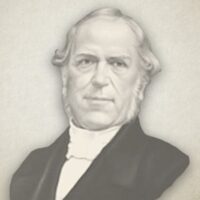
Chapter 13—On Communion, Answering The Charge Of Inconsistency
Mr. Bridgman: “That your sect goes too far, much too far, or to be thoroughly consistent with a bad principle, not far enough.”
My Reply:
1. We go too far for you and for your opinion it seems, and too far for the confederating, accommodating, faithless, fleshly spirit of the age; and consequently too far for our own carnal interest, but not far enough to establish a bad principle, and so not too far for the word of God, and not far enough for you to condemn us, except by your own opinion. This is just were we wish to be, out-running all supineness in regard to the sacred text as our only standard and our rule, without going into extravagance by any unhallowed constructions upon the holy word of God.
2. By our going too far and not far enough, I suppose you mean, that for us to be so particular on communion we ought to be equally particular about some other things that are recorded in the New Testament that we do not literally practice. I know there are such things, but you must prove to us that they are standing perpetual ordinances by the command of the Lord to the end of time, as evidently as the ordinances of baptism and the communion at the table are; and as evidently exampled out to us for the same purpose. The selling of all their possessions by the first converts, and the having all things common among them who then believed, were from circumstances which rendered that order of their affairs necessary for their support. Acts 4:34. 35. And that also in the wisdom of all foreseeing providence, brought the value of their estates into happy use for themselves and for the Lord’s young church, before they should be scattered abroad by the hand of persecution and so lose the whole forever, and their enemies enrich themselves thereby. Benevolence among the saints, and to each other as such, by his love and for his name sake who hath sanctified them, is a lovely principle and action of vital godliness; but their selling pf their whole possessions and casting all the value into God’s cause, was the result of divine influence peculiar to the time and circumstances of the church, and may be reckoned among the divine miracles of wisdom, power, and love; and not of perpetual command. The exercise of that family principle was enjoined by command, and encouraged by divine promise and example, but to that extent, and in that way, was purely optional; as the apostle Peter very evidently shews. Acts 5:4. And the after accounts of the collecting for the poor saints, shews that it was done by voluntary contributions, as we do now; but that the possessions of them that had them were not then sold and given up; so that as that practice did not continue, even though the days of apostles, it never was commanded in the shape and obligation of an appointed standing institution of God. And there are several other things to which perhaps you may refer, but they are so much of a similar nature and so unlike the two great standing distinguishing and perpetual ordinances of baptism and the Lord’s supper, that I deem it unnecessary to notice them till further called upon; except that of laying on of hands, which I would just name. It appears that the laying on of hands, and that which is so called in the scriptures, was for the purpose of conferring extraordinary gifts, as that of tongues &c; and there is no evidence that they were laid on for any other purpose—healing being a different thing. And this, was done by the apostles only, by the power of the Holy Spirit that was so with and upon them, and by no one else; for Philip that great graced evangelist of God, did not so lay his hands on any one at Samaria, but the apostles only did it when they came there. Acts 8:17. 18; and therefore it was never an appointed perpetual ordinance, or authorized beyond the apostles. However we are none of us perfect, and how much so ever we may be ignorantly deficient in all things, we challenge you before God, the elect angels, and all good men, to prove your charge, and that we are not fully authorized by the sacred text to go as far as we do as a ” sect,” practically on the subject of communion.
John Foreman (1792-1872) was a Strict and Particular Baptist preacher. He was appointed the Pastor of Hill Street Chapel, Marylebone, serving this position for close to forty years.
JOHN FOREMAN'S LIFE AND MINISTRY
JOHN FOREMAN ON DUTY FAITH (COMPLETE)
JOHN FOREMAN'S BAPTISM AND COMMUNION CONSIDERED (COMPLETE)




